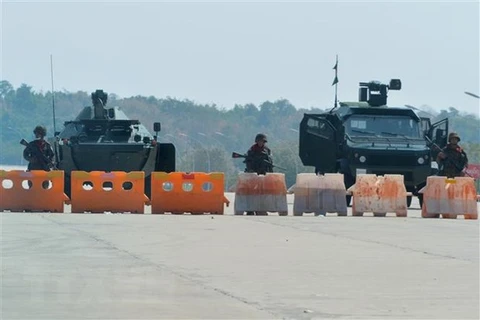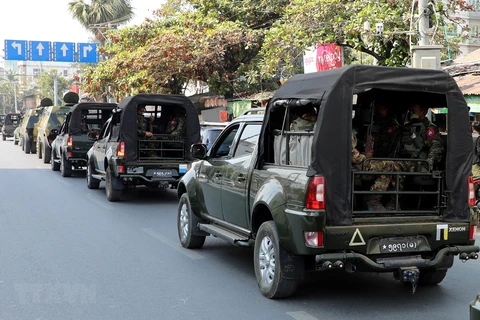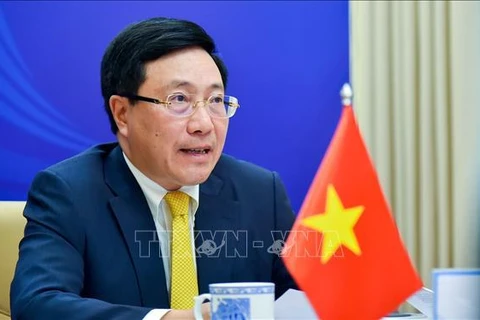Hanoi (VNA) – An informal meeting via videoconference of foreign ministers of 10 ASEAN member states took place on March 2 and ended with the release of a Chair's Statement. The following is the full text of the document:
Chair’s Statement on the Informal ASEAN Ministerial Meeting (IAMM)
1. The Informal ASEAN Ministerial Meeting (IAMM) was convened on 2 March 2021 via videoconference, with the view to progress the implementation of the ASEAN Community Vision 2025, work on an ASEAN Community post-2025 vision, advance ASEAN’s initiatives to respond to and recover from the Coronavirus Disease 2019 (COVID-19) pandemic, discuss ASEAN’s external relations, as well as exchange views on pressing regional issues of concern.
2. In pursuit of strengthening our regional solidarity, we reiterated that the political stability in ASEAN Member States is essential to achieving a peaceful, stable and prosperous ASEAN Community. We underscored the need to maintain our unity, Centrality, and relevance in the region and to collectively address common challenges. We recognised that the strength of the ASEAN Community lies in putting people at its centre. In this regard, we recall the purposes and principles enshrined in the ASEAN Charter, including adherence to the rule of law, good governance, the principles of democracy and constitutional government, respect for fundamental freedoms, and the promotion and protection of human rights.
3. We noted the current progress on developing an ASEAN Community post-2025 vision and acknowledged the importance of continuity in this multi-year endeavour, such as having it co-chaired by a permanent shepherd for the duration of the visioning exercise together with the incumbent ASEAN Chair. We also agreed that the development of this vision should be pursued in a comprehensive, pragmatic, balanced, inclusive and coordinated manner across the three ASEAN Community pillars, sectoral bodies and with the relevant stakeholders, including at the Leaders’ level.
4. We reaffirmed our support for Brunei Darussalam’s priorities and deliverables under the theme of “We Care, We Prepare, We Prosper”, and agreed to develop a Strategic and Holistic Initiative to Link ASEAN Responses to Emergencies and Disasters (ASEAN SHIELD) across the three ASEAN Community pillars. We reaffirmed our belief that regionalism and multilateralism are important principles and frameworks of cooperation.
5. We discussed ASEAN’s collective response to overcome the COVID-19 pandemic and reiterated our commitment to implement the initiatives in the Implementation Plan of the ASEAN Comprehensive Recovery Framework in a timely and effective manner. We welcomed the establishment of the Task Force on the Operationalisation of the ASEAN Travel Corridor Arrangement Framework (ATCAF) and encouraged the expeditious conclusion of the ATCAF. We welcomed the decision to utilise 10.5 million USD from the COVID-19 ASEAN Response Fund to procure vaccines for the people of ASEAN as soon as possible. We encouraged the early operationalisation of the ASEAN Regional Reserve of Medical Supplies for Public Health Emergencies and the timely establishment of the ASEAN Centre for Public Health Emergencies and Emerging Diseases. We noted efforts to address the impacts of the pandemic on ASEAN’s Community building as well as efforts to narrow the development gap in the region.
6. We agreed to maintain ASEAN’s proactive and outward-looking approach in the conduct of ASEAN’s external relations based on shared interest, constructive engagements, and mutual benefits, which can contribute to ASEAN’s Community building and development cooperation efforts, as well as efforts to ensure swift, comprehensive, and sustainable regional recovery from the COVID-19 pandemic.
We underscored the importance of further strengthening ASEAN Centrality and unity in our engagement with ASEAN’s external partners through ASEAN-led mechanisms in order to build mutual trust and confidence as well as to reinforce open, transparent, inclusive, and rules-based regional architecture with ASEAN at the centre. In this regard, we looked forward to convening the Special ASEAN United States Foreign Ministers’ Meeting in the near future, and other engagements with external partners. We also looked forward to activities to commemorate the 30th anniversary of ASEAN-China Dialogue Relations as well as the 25th anniversary of ASEAN-Russia Dialogue Relations.
7. We exchanged views on regional and international issues of concern, including the situation in the South China Sea and the Korean Peninsula. We underscored the need to maintain our unity, Centrality and relevance in the region and to collectively address common challenges.
8. We, as an ASEAN family, have been closely following the current developments in the ASEAN region and concurred that the political stability in any and all ASEAN Member States is essential to achieving a collective peaceful, stable and prosperous ASEAN Community. We expressed our concern on the situation in Myanmar and called on all parties to refrain from instigating further violence, and for all sides to exercise utmost restraint as well as flexibility. We also called on all parties concerned to seek a peaceful solution, through constructive dialogue, and practical reconciliation in the interests of the people and their livelihood. In this regard, we expressed ASEAN’s readiness to assist Myanmar in a positive, peaceful and constructive manner.
9. We also heard some calls for the release of political detainees and for the United Nations Secretary-General’s Special Envoy on Myanmar to engage the parties concerned.
10. We also underscored the importance of Myanmar’s continued efforts in addressing the situation in the Rakhine State, including commencing the repatriation process, in voluntary, safe and dignified manner in accordance with its bilateral agreements with Bangladesh. We reiterated our appreciation to the Secretary-General of ASEAN for his efforts in leading the implementation of the recommendations of the Preliminary Needs Assessment (PNA). We looked forward to the conduct of the Comprehensive Needs Assessment (CNA) and encouraged the Secretary-General of ASEAN to continue identifying possible areas to effectively facilitate the repatriation process for displaced persons from Rakhine State./.
Chair’s Statement on the Informal ASEAN Ministerial Meeting (IAMM)
1. The Informal ASEAN Ministerial Meeting (IAMM) was convened on 2 March 2021 via videoconference, with the view to progress the implementation of the ASEAN Community Vision 2025, work on an ASEAN Community post-2025 vision, advance ASEAN’s initiatives to respond to and recover from the Coronavirus Disease 2019 (COVID-19) pandemic, discuss ASEAN’s external relations, as well as exchange views on pressing regional issues of concern.
2. In pursuit of strengthening our regional solidarity, we reiterated that the political stability in ASEAN Member States is essential to achieving a peaceful, stable and prosperous ASEAN Community. We underscored the need to maintain our unity, Centrality, and relevance in the region and to collectively address common challenges. We recognised that the strength of the ASEAN Community lies in putting people at its centre. In this regard, we recall the purposes and principles enshrined in the ASEAN Charter, including adherence to the rule of law, good governance, the principles of democracy and constitutional government, respect for fundamental freedoms, and the promotion and protection of human rights.
3. We noted the current progress on developing an ASEAN Community post-2025 vision and acknowledged the importance of continuity in this multi-year endeavour, such as having it co-chaired by a permanent shepherd for the duration of the visioning exercise together with the incumbent ASEAN Chair. We also agreed that the development of this vision should be pursued in a comprehensive, pragmatic, balanced, inclusive and coordinated manner across the three ASEAN Community pillars, sectoral bodies and with the relevant stakeholders, including at the Leaders’ level.
4. We reaffirmed our support for Brunei Darussalam’s priorities and deliverables under the theme of “We Care, We Prepare, We Prosper”, and agreed to develop a Strategic and Holistic Initiative to Link ASEAN Responses to Emergencies and Disasters (ASEAN SHIELD) across the three ASEAN Community pillars. We reaffirmed our belief that regionalism and multilateralism are important principles and frameworks of cooperation.
5. We discussed ASEAN’s collective response to overcome the COVID-19 pandemic and reiterated our commitment to implement the initiatives in the Implementation Plan of the ASEAN Comprehensive Recovery Framework in a timely and effective manner. We welcomed the establishment of the Task Force on the Operationalisation of the ASEAN Travel Corridor Arrangement Framework (ATCAF) and encouraged the expeditious conclusion of the ATCAF. We welcomed the decision to utilise 10.5 million USD from the COVID-19 ASEAN Response Fund to procure vaccines for the people of ASEAN as soon as possible. We encouraged the early operationalisation of the ASEAN Regional Reserve of Medical Supplies for Public Health Emergencies and the timely establishment of the ASEAN Centre for Public Health Emergencies and Emerging Diseases. We noted efforts to address the impacts of the pandemic on ASEAN’s Community building as well as efforts to narrow the development gap in the region.
6. We agreed to maintain ASEAN’s proactive and outward-looking approach in the conduct of ASEAN’s external relations based on shared interest, constructive engagements, and mutual benefits, which can contribute to ASEAN’s Community building and development cooperation efforts, as well as efforts to ensure swift, comprehensive, and sustainable regional recovery from the COVID-19 pandemic.
We underscored the importance of further strengthening ASEAN Centrality and unity in our engagement with ASEAN’s external partners through ASEAN-led mechanisms in order to build mutual trust and confidence as well as to reinforce open, transparent, inclusive, and rules-based regional architecture with ASEAN at the centre. In this regard, we looked forward to convening the Special ASEAN United States Foreign Ministers’ Meeting in the near future, and other engagements with external partners. We also looked forward to activities to commemorate the 30th anniversary of ASEAN-China Dialogue Relations as well as the 25th anniversary of ASEAN-Russia Dialogue Relations.
7. We exchanged views on regional and international issues of concern, including the situation in the South China Sea and the Korean Peninsula. We underscored the need to maintain our unity, Centrality and relevance in the region and to collectively address common challenges.
8. We, as an ASEAN family, have been closely following the current developments in the ASEAN region and concurred that the political stability in any and all ASEAN Member States is essential to achieving a collective peaceful, stable and prosperous ASEAN Community. We expressed our concern on the situation in Myanmar and called on all parties to refrain from instigating further violence, and for all sides to exercise utmost restraint as well as flexibility. We also called on all parties concerned to seek a peaceful solution, through constructive dialogue, and practical reconciliation in the interests of the people and their livelihood. In this regard, we expressed ASEAN’s readiness to assist Myanmar in a positive, peaceful and constructive manner.
9. We also heard some calls for the release of political detainees and for the United Nations Secretary-General’s Special Envoy on Myanmar to engage the parties concerned.
10. We also underscored the importance of Myanmar’s continued efforts in addressing the situation in the Rakhine State, including commencing the repatriation process, in voluntary, safe and dignified manner in accordance with its bilateral agreements with Bangladesh. We reiterated our appreciation to the Secretary-General of ASEAN for his efforts in leading the implementation of the recommendations of the Preliminary Needs Assessment (PNA). We looked forward to the conduct of the Comprehensive Needs Assessment (CNA) and encouraged the Secretary-General of ASEAN to continue identifying possible areas to effectively facilitate the repatriation process for displaced persons from Rakhine State./.
VNA
























